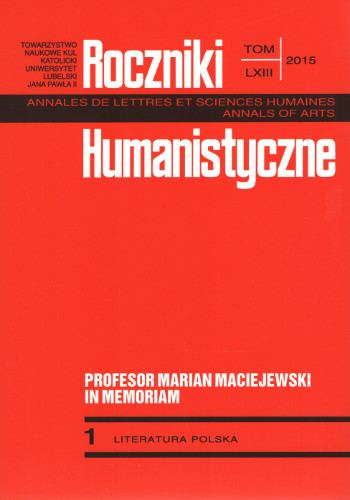Idee genologiczne Mariana Maciejewskiego
Marian Maciejewski's Genological Ideas
Author(s): Dariusz SewerynSubject(s): Polish Literature
Published by: Towarzystwo Naukowe KUL & Katolicki Uniwersytet Lubelski Jana Pawła II
Keywords: sonnet series; literary genre; tale; genology; history of literature; image; romantic tale in verse;
Summary/Abstract: The sketch is concerned with selected aspects of Marian Maciejewski's thought about theory of literature. Although the scholar was first of all a historian of literature, it is not hard to notice some inclination towards creative exploration of issues connected with theory of literature in his academic writings, at least to the degree needed to solve the historico-literary problems that appeared in the course of his research.Especially genological problems aroused Maciejewski's interest − some noteworthy propositions that he presented with respect to them, even if they do not form a universal theoretical conceptualization, still they do deserve to be approached in the categories of “genological ideas”. Ideas understood in this way include the way Maciejewski uses the category of image, in the meaning that is by no means limited to “poetical imagery”. Applied to Mickiewicz's Crimean Sonnets, as well as to his Lausanne lyrics, the image becomes a synonym of more broadly understood poetical vision, that, in turn − supported either by Władysław Strzemiński's “theory of vision” (in the case of the Crimean series), or by traditions of mystical theology (in the case of the Lausanne poems) − gains operational utility, as a key analytical-interpretative category, at the same time forming often unexpectedly complex frames of reference.In the notional field of so understood image as a technical term both the “image of the author” and the genological issue are contained - both these aspects are joined in Maciejewski's discourse about the poetical novel and the Romantic tale. This is because in the scholar's approach not only a literary text, understood as activation and actualization of a defined system of rules may be the carrier of the image (in the individual-existential dimension as well as in the dimension of program ideas of a literary current): also the very literary genre may be the carrier. In other words, the semantics of the structure occurs not only on the side of the parole, but also on the side of the langue. The consequence of such an approach is the ssumption, made and applied especially in Maciejewski's studies of the tale, that in certain particular cases an individual work may realize genre norms in such a way that its meaning structure can be explained in the categories of a meta-genre discourse. It is exactly this assumption that is suggested by the very title of the treatise A Tale About the Tale”. This tale about the tale is an introduction to an anthology, which is obvious; however, also Rzewuski's A Confererate Sermon appears to Maciejewski as a tale about the tale. Analogical premises have allowed the scholar to decide the question of the historico-literary status of Malczewski's Maria as of a text completely belonging to the Romantic epoch.
Journal: Roczniki Humanistyczne
- Issue Year: 63/2015
- Issue No: 01
- Page Range: 147-155
- Page Count: 9
- Language: Polish

